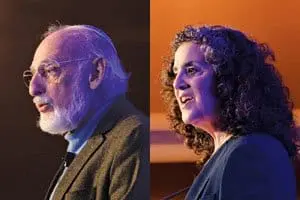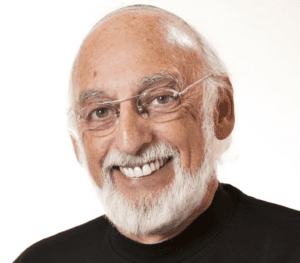In their featured address, the Gottmans explored what research has revealed about the crucial role the brain’s seven different command systems can play in enhancing the quality of couples’ emotional connection.
In our research, we’ve found that successful couples turned toward their partner’s bids for connection 86 percent of the time. A bid can be something as simple as saying to a partner, “Wow, look at that beautiful boat out the window.” Then the partner can turn away by either ignoring the bid or responding, “Would you stop interrupting me? I’m trying to read.” Or the partner can turn toward the bid with even a simple acknowledgement, like “Huh, look at that.” Every time people turn toward each other in relationships, they’re building up an emotional bank account.
Jaak Panksepp, who wrote Affective Neuroscience, detailed the seven different emotional command systems in the brain. We’ve found that when you’re helping couples turn toward each other, you have to help them do so in all seven of the emotional command systems that are hard-wired into the brain.
So let me describe each one of these in our terms. The first is The Sentry, which is all about the fear system. When one partner feels afraid to go to the grocery store, for example—maybe a shooting just happened near there—what does the partner do? Does the partner turn toward them and say, “Okay, I’ll go instead,” or “I’ll go with you”? Or does the partner say, “Get over it” or “Just go to another store,” essentially turning away. In other words, how do people respond to each other’s need for protection or help with fear?
The Nest Builder is all about nurturing: that’s when one partner needs warmth, connection, and nurturing. How does the other partner respond to that? The Explorer is about adventure, discovery, and The Jester is about having fun. John and I have a gigantic difference here, and that’s what you’ll see in many couples. My idea of fun and adventure is going to Antarctica, and John’s is sitting in his chair, reading about differential equations. So when he tries to explain these to me, I make an effort to turn toward him and say, “Tell me all about it,” which is a huge stretch for me. But it’s important that we help couples who have different ways of having fun turn toward each other’s preferences.
The Sensualist is all about passion, romance, physical intimacy, sexuality. So how are couples doing in terms of turning toward each other and speaking about their preferences, their fantasies, what they really love in the bedroom as well as on the kitchen table? It’s really helpful for us to support couples in turning toward each other in that arena as well.
The Commander in Chief is at the center: it’s about power struggles. Who’s going to have power? Who’s going to decide things? Are they going to share power, or are they comfortable with one person being more powerful in this area and another in that area? It’s important to help people create what they’re comfortable with. Finally, The Energy Czar is really about our own metabolism and basic needs for sleep, food, nutrition, exercise. In this arena, it’s all about partners supporting each other’s energy needs.
Now let’s talk a bit more about turning toward bids in the sensual system. There’s a fabulous book called The Normal Bar, in which the authors conducted a study with 70,000 people in 24 countries, asking what helps couples have a great sex life. The couples they asked were from all walks of life, all classes, all different socioeconomic statuses, all different ethnic and racial origins. What they found across the board were that people who have a great sex life say “I love you” to their partner every day and mean it. They kiss one another passionately for no reason at all, give compliments, give surprise romantic gifts, know what turns their partner on and do it often, are affectionate in public, play together, have fun—and they cuddle, cuddle, cuddle. Cuddling is good; nurturing is good for sex. These people make sex a priority, talk about their sex life, have weekly romantic dates, take romantic vacations.
In contrast, the Sloan center at UCLA found that couples who have a bad sex life spend very little time together with each other: they become job- and child-centered. They talk mostly about their huge to-do lists during the 35 minutes they spend together a week. Think about that: they talk 35 minutes a week on average. They make everything else a priority, rather than their relationship, and they drift apart, live parallel lives, and are terribly lonely.
So the keys to great sex aren’t rocket science, right? Although a few differing theories are floating around out there, these keys are pretty much what you’d expect: warmth, building trust, attunement, talking about preferences, and lots and lots of connection.
Photo by Sam Levitan
John Gottman
John Gottman, Ph.D., was voted one of the Top 10 Most Influential Therapists of the past quarter century and was recently honored with the 2021 Lifetime Achievement Award by the Psychotherapy Networker. Professor Emeritus in Psychology at the University of Washington, Dr. Gottman is known for his work on marital stability and relationship analysis through scientific direct observations, self-report and physiology. He is the author or co-author of over 200 published academic articles and more than 45 books, including the bestselling The Seven Principles for Making Marriage Work; What Makes Love Last; The Relationship Cure; and Why Marriages Succeed or Fail. He is the co-founder of The Gottman Institute and Affective Software, Inc., which has created a tele-therapy technology that will live on cell phones, computers, and tablets to assist therapists in couples therapy and offer direct relationship building services directly to couples. Learn more at Gottman.com.
Julie Gottman
Julie Gottman, PhD, Co-Founder and President of The Gottman Institute and Co-Founder of Affective Software, Inc., was recently honored with the 2021 Lifetime Achievement Award by the Psychotherapy Networker for decades of work revolutionizing couples therapy. Winner of the Washington State Psychologist of the Year, she has co-authored seven books, including the popular Ten Principles for Doing Effective Couples Therapy; and And Baby Makes Three; and Eight Dates: Essential Conversations for a Lifetime of Love. She is also the co-creator of the immensely popular, The Art and Science of Love weekend workshop for couples, and co-designed the Gottman Method Couples Therapy Clinical Training Program, which she has taught nationally and in over 15 countries. Learn more at Gottman.com.














